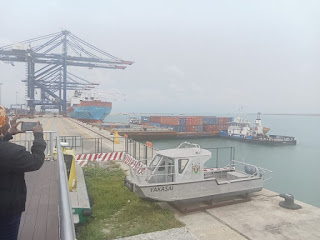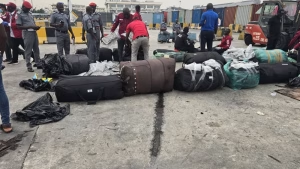
Lekki Deep Sea Port Set to Boost Regional Trade, Targets 500,000 TEUs
Lekki Deep Sea Port is set to nearly double its operations to 500,000 TEUs by the end of 2025, up from 287,000 TEUs in 2024. Since commencing operations in April 2023, the port has a capacity of 1.2 million TEUs.
In a recent interview, Lekki Deep Sea Port’s Deputy COO, Daniel Odibe, expressed optimism about reaching its full capacity soon. The port, situated on 9 hectares of land, boasts impressive infrastructure, including a 2km breakwater ridge and a 9km channel that enables its 4 tugboats to guide large vessels safely to dock and unload cargo.
According to him, economic challenges have hindered port operations, resulting in the shortfall.
Mr. Wang Qiang, who was represented by the Chief operating officer of the port, Young Quarry said, “We continue to push the envelope, set the bar higher to uphold our position as West Africa’s Deepest Sea Port”.
“we are indeed grateful for your exploits in ensuring that the world knows about the Lekki Port and the many milestones we have achieved, from the world-class infrastructure (STS Scanners) to the landmark berthing of ships (14,000 TEUs LNG powered vessel international shipment), as well as official visits and many notable accomplishments that strengthen the position of Lekki Port as a game changer in the Nigerian maritime Industry”.
The Lekki Deep Sea Port is a multi purpose Port that has a drought level of minus 16.5 metres, it has received the largest vessel measuring 366 metres with a capacity of 14,000 TEUs, has a vessel turnaround time of 48 hours, truck turnaround time of 1 hour 25 minutes and a fully integrated automated system.
Mr. Odibe revealed that the Port receives between 10 to 12 vessels every month with a cargo dwell time of 16 days.
He said the scanners only need about 33 seconds to scan a container as soon as the 5 gantry (ship to shore cranes) have done the usual evacuation. The stacking method follows the 7 wide, 6 heights system. Movement of the container from ship to shore takes a maximum of 3 minutes and presently, about 20% of the cargoes are evacuated through barges. The rest are evacuated through road transport as a plan to connect a rail transport system to the Port is in the pipeline.
Speaking on corporate social responsibility, Mr. Odibee said the Lekki Deep Sea Port and sub concessioneers are said to be employing about 30% of their staff from the communities while carrying out some environmental and educational projects within those communities.
However, it was also revealed that a reversal of the previous trend of transhipment of cargoes is happening now as the Port now internationally operates transshipment of cargos to Ghana, Benin Republic and Ivory Coast as well as also experimenting on internal transshipment of cargoes to the Onne Port in Rivers State.
According to Mr Odibee, the Port is reported to have handled 58, 000 TEUs of cargoes in 2023, 287, 000 TEUs in 2024 and that as at the end of June 2025, they have processed a total of 220,000 TEUs with a projection of attaining over 500,000 TEUs of containers by year end.






